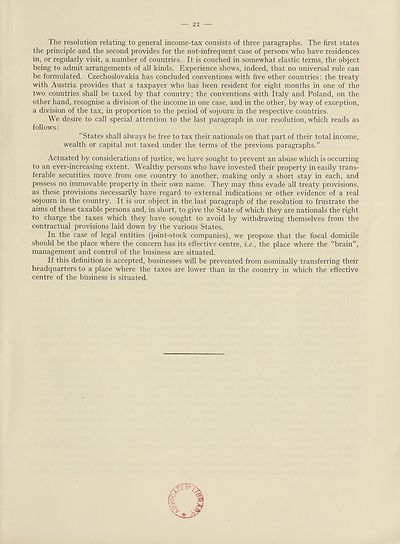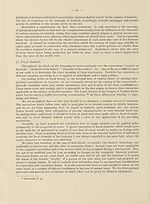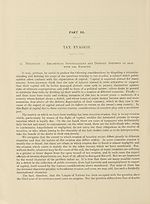Download files
Complete book:
Individual page:
Thumbnail gallery: Grid view | List view

21
The resolution relating to general income-tax consists of three paragraphs. The first states
the principle and the second provides for the not-infrequent case of persons who have residences
in, or regularly visit, a number of countries. It is couched in somewhat elastic terms, the object
being to admit arrangements of all kinds. Experience shows, indeed, that no universal rule can
be formulated. Czechoslovakia has concluded conventions with five other countries: the treaty
with Austria provides that a taxpayer who has been resident for eight months in one of the
two countries shall be taxed by that country; the conventions with Italy and Poland, on the
other hand, recognise a division of the income in one case, and in the other, by way of exception,
a division of the tax, in proportion to the period of sojourn in the respective countries.
We desire to call special attention to the last paragraph in our resolution, which reads as
follows:
“States shall always be free to tax their nationals on that part of their total income,
wealth or capital not taxed under the terms of the previous paragraphs.”
Actuated by considerations of justice, we have sought to prevent an abuse which is occurring
to an ever-increasing extent. Wealthy persons who have invested their property in easily trans¬
ferable securities move from one country to another, making only a short stay in each, and
possess no immovable property in their own name. They may thus evade all treaty provisions,
as these provisions necessarily have regard to external indications or other evidence of a real
sojourn in the country. It is our object in the last paragraph of the resolution to frustrate the
aims of these taxable persons and, in short, to give the State of which they are nationals the right
to charge the taxes which they have sought to avoid by withdrawing themselves from the
contractual provisions laid down by the various States.
In the case of legal entities (joint-stock companies), we propose that the fiscal domicile
should be the place where the concern has its effective centre, i.e., the place where the “brain”,
management and control of the business are situated.
If this definition is accepted, businesses will be prevented from nominally transferring their
headquarters to a place where the taxes are lower than in the country in which the effective
centre of the business is situated.
The resolution relating to general income-tax consists of three paragraphs. The first states
the principle and the second provides for the not-infrequent case of persons who have residences
in, or regularly visit, a number of countries. It is couched in somewhat elastic terms, the object
being to admit arrangements of all kinds. Experience shows, indeed, that no universal rule can
be formulated. Czechoslovakia has concluded conventions with five other countries: the treaty
with Austria provides that a taxpayer who has been resident for eight months in one of the
two countries shall be taxed by that country; the conventions with Italy and Poland, on the
other hand, recognise a division of the income in one case, and in the other, by way of exception,
a division of the tax, in proportion to the period of sojourn in the respective countries.
We desire to call special attention to the last paragraph in our resolution, which reads as
follows:
“States shall always be free to tax their nationals on that part of their total income,
wealth or capital not taxed under the terms of the previous paragraphs.”
Actuated by considerations of justice, we have sought to prevent an abuse which is occurring
to an ever-increasing extent. Wealthy persons who have invested their property in easily trans¬
ferable securities move from one country to another, making only a short stay in each, and
possess no immovable property in their own name. They may thus evade all treaty provisions,
as these provisions necessarily have regard to external indications or other evidence of a real
sojourn in the country. It is our object in the last paragraph of the resolution to frustrate the
aims of these taxable persons and, in short, to give the State of which they are nationals the right
to charge the taxes which they have sought to avoid by withdrawing themselves from the
contractual provisions laid down by the various States.
In the case of legal entities (joint-stock companies), we propose that the fiscal domicile
should be the place where the concern has its effective centre, i.e., the place where the “brain”,
management and control of the business are situated.
If this definition is accepted, businesses will be prevented from nominally transferring their
headquarters to a place where the taxes are lower than in the country in which the effective
centre of the business is situated.
Set display mode to:
![]() Universal Viewer |
Universal Viewer | ![]() Mirador |
Large image | Transcription
Mirador |
Large image | Transcription
Images and transcriptions on this page, including medium image downloads, may be used under the Creative Commons Attribution 4.0 International Licence unless otherwise stated. ![]()
| League of Nations > Economic and financial section > Double taxation and tax evasion > (27) |
|---|
| Permanent URL | https://digital.nls.uk/190911659 |
|---|
| Shelfmark | LN.II |
|---|
| Description | Over 1,200 documents from the non-political organs of the League of Nations that dealt with health, disarmament, economic and financial matters for the duration of the League (1919-1945). Also online are statistical bulletins, essential facts, and an overview of the League by the first Secretary General, Sir Eric Drummond. These items are part of the Official Publications collection at the National Library of Scotland. |
|---|---|
| Additional NLS resources: |
|

